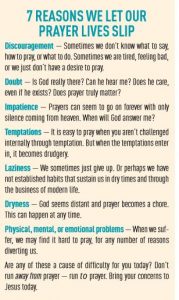
Tips For Growing a Healthy Prayer Life
MARCEL LE JEUNE
I once surveyed a class of parishioners about their prayer lives, asking them to rate how they thought they were doing at that moment. The clear majority rated their prayer lives as “poor” or “very poor.” Few were pleased with the current state of their prayer lives. And these were the more active parishioners — those seeking out further engagement with their faith by coming to a weeknight class! Unfortunately, this is likely a familiar scenario at many parishes. Most parishioners may not have a consistent daily prayer life, but they yearn for it. They have the desire and willingness to go deeper, but they need some assistance.
Real Work and Real Love
Prayer takes a lot of work. We ought to help others know that it is normal to have difficulty with prayer. In many ways prayer is like any other relationship, and many of us start out basing our prayer lives on good experiences and emotions. Just as in a growing romantic relationship, good feelings help motivate and bring two people closer together. Yet real love can only be fostered once we stop relying on emotional highs and great experiences. Once the good emotions leave or level off, we must decide to love the other person for their own sake, not for what they do for us. Real love is choosing what is best for another person regardless of the cost to oneself.
This kind of love doesn’t come easy, and there are times when we feel far from God and our prayer seems dry. But we need to continue to pray, even though it may not feel good to do so. To choose to pray, even when we may not want to, because we know it is the best thing to do, is a sign of true love. If we continue to pray, our faith will continue to grow beyond our feelings. These dry times, then, can be a gift from God. They may not feel like a gift, but they truly are. They give us the opportunity to leave behind our feelings and go deeper in a true loving relationship with God.
Think of it this way. Which would be more pleasing to God — 20 minutes of prayer that came easy and was accompanied by great emotions, or 20 minutes where you struggled, didn’t want to do it, felt dryness, and yet did it anyway? OK, this is a trick question, because I can’t speak for God. God desires our prayer at any time for sure! But I would say the second case is equally valuable to the first, because you chose to do it even though you didn’t want to, and you may have received little or no consolation. This is where our love for God is stretched and grows. So let’s remind others, as well as ourselves, not to waste such an opportunity in prayer!
The Holy Spirit is Our Help
St. Paul taught that we should “pray at every opportunity” (Ephesians 6:18). If we are to follow this command, prayer should be done out of love, not out of mere obedience. But, how are we to meet this high call? Paul wrote in another letter, “In the same way, the Spirit too comes to the aid of our weakness; for we do not know how to pray as we ought, but the Spirit itself intercedes with inexpressible groanings” (Romans 8:26).
We do not pray alone. The Holy Spirit does for us what we can’t do for ourselves. This is vital, because prayer is essential for success in the Christian life. And by success, I mean success in the eyes of God, which is much different than success by the world’s standards. The world says success is money, fame, power, possessions, pleasure, and more. But God’s idea of success is holiness — being the person God intends you to be. Success is fulfilling the vision for your life that God has for you. To attain this, prayer is indispensable.
Tips for Growing a Healthy Prayer Life
FREQUENT THE SACRAMENTS. If you can make daily Mass even once a week besides Sunday Mass, you have doubled your access to the greatest gift ever given humanity. If you go to confession at least monthly, you are surely going to get a multitude of graces. Put these on your calendar so you don’t skip them.
ESTABLISH GOOD HABITS. You should be able to rely on your habits to help you, not hurt you, in your prayer. Experts recommend that a good habit takes about 66 days to establish.
ACCOUNTABILITY COUNTS. The battle of prayer is strengthened when we share accountability with others. We aren’t meant to be isolated spiritual warriors, but an army, united in prayer together. Find someone who is more objective than you are to look at your prayer life, see how you are doing, and observe how the Holy Spirit is working. A small group, a good friend, or a spiritual director can be invaluable.
TRY DIFFERENT TYPES OF PRAYER. We all have different tastes in prayer. Try out different types of prayer and see which ones work for you. One caveat: Don’t give up too soon. It might take a long time to discover whether a particular method is good for you or not.
FAST REGULARLY. There is great power in fasting. We see it in Scripture when Jesus fasts. When we have more control over the desires of our bodies, we can pray better.
OVERCOME DISTRACTIONS. The simple way to overcome a distraction is to not give in to it. Once you realize you are distracted, turn your heart and mind back to your prayer, not the distraction. This simple act is the easiest way to defeat distractions.
DON’T OVERTHINK PRAYER. Too often we tend to complicate something that should come naturally to us. We are made for communion with God. Prayer is merely directing your mind and heart in the direction of God. If we overcomplicate it, we get caught up in the externals.
Work on a proper understanding of God and self I cannot emphasize this enough. Many of us struggle to understand how a perfect God could love us and want a relationship with us. But this is due mainly to our own lowered perceptions of ourselves and our dignity. It is not rooted in God’s perception of us, or in the way he loves us unconditionally.
GET QUIET. Our modern lives are filled with noise. We need to quiet ourselves to hear God — both internally and externally. Find a peaceful and quiet place to pray.
PRIORITIZE PRAYER. Schedule your prayer time. Bump something else. Get up early. Do whatever you need to do, but don’t let a day go by without spending time with the most important person in your life.
DON’T BE TOO HARD ON YOURSELF. Struggles in your prayer life do not make you a terrible Christian. They are a universal experience of everyone who prays.
DON’T WAIT TO START. Procrastination is the enemy of prayer. If you feel called to pray, don’t put it off.
FIND AND USE GOOD RESOURCES. When you don’t know what to do or how to do it, there are resources that can help. These include people, friends, books, websites, sacramentals (rosaries, sacred medals), and Scripture.
PRAY IN GOOD TIMES AND THE NOT-SO-GOOD TIMES. A few years ago my wife and I got into an argument about some silly little thing. I thought we were done with the issue, but it cropped up again the next day. I got upset and was not very happy. My wife was also unhappy with me. Later, when we got ready to go to bed, there was still tension in the air. And then my wife asked, “Do you want to pray?” Honestly, I didn’t want to. When we are upset, agitated, angry, or out of sorts, sometimes the last thing we want to do is pray. But that is exactly what we need to do at those times. We did end up praying, and it certainly helped.
Our state of mind, our situation in life, and our emotions can all cause us to have little desire to spend time in prayer. But our love for God, which can be expressed by us choosing to pray no matter how we feel at the time, shouldn’t merely depend on getting good feelings out of our prayer. If I decided to leave my wife because of an argument, I wouldn’t be a very good husband. The same is true if I stopped praying because I didn’t feel good about it. In that case, I wouldn’t be a very good disciple, either.
So the next time you don’t feel like praying, do it anyway. I guarantee that your Father in heaven will be happy with you when you choose to pray even though you may struggle to do it. He isn’t looking for perfection, good feelings, or an easy prayer. He just wants a faithful heart — in good times and bad.
Teaching perseverance in prayer may be the most valuable thing you can do for another person’s spiritual life. Remember, your ability to impact those you catechize is directly affected by your relationship with God. So don’t let your prayer life slide!
MARCEL LEJEUNE, MTS, is the president and founder of Catholic Missionary Disciples. His great passion is Jesus and making him known. Marcel is an evangelist, international speaker, author of three books, and contributor to several others. He is a husband and father of five. Find out more at CatholicMissionaryDisciples.com.
This article was originally published in Catechist magazine, February, 2018
Photo Credit: GALYNA ANDRUSHKO/SHUTTERSTOCK




